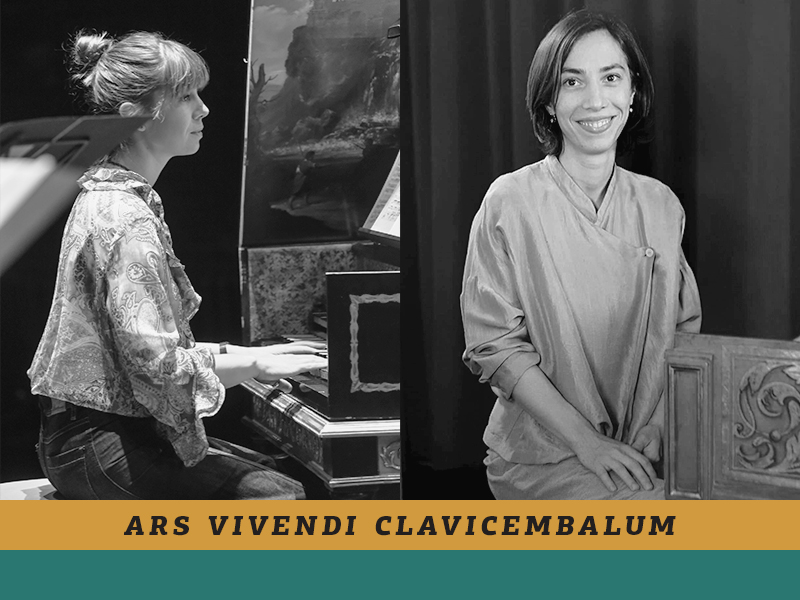21st International Festival “Ars vivendi clavicembalum” – JOVANA TOPALOV and DANICA BURIĆ

The Sound of Movement
Program:
Girolamo Frescobaldi (1583–1643)
Aria detto Baletto
Johann Jacob Froberger (1616–1667)
Partita auff die Mäyerin
Louis Couperin (1626-1661)
Suite in F
Prelude – Allemande grave – Courante – Sarabande – Branle de basque – Gigue – Gaillarde – Chaconne
Jean-Baptiste Lully (1632–1687)
Sarabande
choreography by Louis-Guillaume Lully Pécour (1653-1729)
Jean Anry D’Anglebert (1629–1691)
Prelude in g
François Couperin (1668–1733)
Sarabande La Majestueuse – Les Sentimens
Jean-Baptiste Lully / Louis-Guillaume Lully Pécour
Entrée
Ernesto Nazareth (1863–1934)
Odeon
Anonymus
Recueil de Contredances par Mr Feuillet – Bouree La Bacante
Biographies:
Jovana Topalov is a harpsichordist from Belgrade, Serbia. She graduated piano and harpsichord at the Faculty of Music in Belgrade, after which she continued her education at the University of Illinois at Urbana-Champaign, USA where she graduated with a master degree in early music and harpsichord. In October 2018, she successfuly completed her Doctorate Academic studies at the Faculty of Music in Belgrade by defending her dissertation titled The Narrative potential of harpsichord: The elements of improvisation and musical rethoric in the interpretation of programmatic allemands and lamentations by Johann Jacob Froberger.
Jovana participated in numerous Baroque masterclasses, workshops and festivals which had an important role in her professional development, and enabled her to collaborate with prominent artists in the field of early music such as Jory Vinikour, Siegbert Rampe, Davitt Moroney, Blandine Rannou, Frédérick Haas, Ruben Dubrovski, Aline Zyelberajch and others. For a number of years, she was a scholarship holder of the Austrian Baroque Academy, which granted her the Special Award for Excellence in 2011.
Jovana is actively performing as a soloist, as well as a basso continuo accompanist (MCCG, SORTS, Belgrade SAXperience…). From 2012 she is a member of the musical ensemble Belgrade Baroque, which focuses on historically informed performance practice of 17 th and 18th century music, playing on replicas of period instruments. Jovana is the president and one of the founders of the Belgrade Baroque assosciation whose goal is the promotion of higher values of musical and performing arts, with a special focus on the music of 17th and 18th centuries. Since May 2022 she is teaching harpsichord and ensemble playing at Early Music department in MS «Josip Slavenski», Belgrade.
Danica Burić (harpsichord, baroque dance) completed her Piano master studies at Faculty of Music Art, University of Arts in Belgrade in the class of Lidija Stanković. Durig her studies she took part in numerous solo and chamber music competitions; she is also awardee of the prestigious Dositeja scholarship.
After a year of specialization in harpsichord in Strasbourg with Aline Zylberajch, she enrolled in Early Music-Harpsichord studies in Bremen, where she is currently studying for a master’s degree in the class of Carsten Lohff and Sebastian Wienand. She has had the opportunity to work with renowned artists such as Menno van Delft and Elisabeth Joyé.
Parallel to her harpsichord studies, she began to engage in baroque dance with Carla Linné, in whose ensemble Les amis de Pécour she currently performs. She has performed in concerts in Germany, Austria, Denmark, France and Serbia, as well as for radio and children’s theater. Lili’s opera Achille et Polyxéne, in which she danced with Les amis de Pécour, is currently in post-production.
In addition to her artistic work, she is also interested in pedagogy: besides piano lessons, she holds baroque dance workshops. With the ensemble Terpsichore Bremensis, she designed and held a series of workshops in primary schools in Lower Saxony, as part of the program Musik zu Gast im Klassenzimmer.
She is particularly interested in the French harpsichord school, where she studies the specific connection between music and dance, as well as the late development of performance technique.